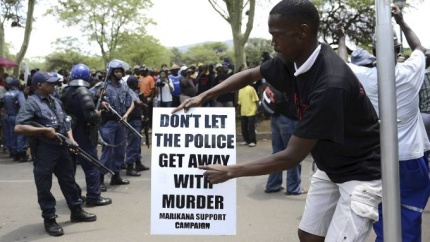
Image: IHSAAN HAFFEJEE
The SA government needs to improve the rule of law to protect detainees‚ human rights campaigners and migrants – and to tighten safeguards against the invasion of individual privacy from state surveillance.
This is among the recommendations contained in the UN Human Rights Committee’s assessment of the country’s commitment to the provisions of the International Covenant on Civil and Political Rights. The committee received submissions from the government and civil society organisations before releasing its findings.
Key areas of concern include: – Violence‚ torture‚ ill-treatment‚ and deaths in custody – Prison conditions – Right to privacy and interception of private communications‚ and – Protection of human rights activists.
“The Committee is concerned about reports of threats‚ intimidation‚ harassment‚ excessive use of force and physical attacks‚ some resulting in deaths‚ by private actors and police forces against human rights defenders‚ in particular those working on corporate accountability‚ land rights‚ and transparency issues‚ as well as LGBTI and HIV activists.
“It also notes with concern reports about the lack of due diligence of law enforcement officers in protecting human rights defenders‚ including registering and investigating allegations of human rights violations‚ and in securing accountability for such violations‚” the UN report said.
“The State party should take all the necessary steps to protect the right of human rights defenders to freedom of expression‚ association and peaceful assembly. It should ensure that police officials receive adequate training regarding the protection of human rights defenders. The State party should also thoroughly investigate all attacks on the life‚ physical integrity and dignity of these persons‚ bring perpetrators to justice and provide victims with appropriate remedies.”
The remarks come after the fatal shooting of an anti-mining activist on the Wild Coast earlier this month. Bazooka Rhadebe was the chairperson of the Amadiba Crisis Committee‚ which has been actively opposing the proposed mining in the Xolobeni area. Assault and intimation of anti-mining community members had occurred before‚ but this was the first time someone had been murdered‚ the Legal Resource Centre said in a previous statement.
The UN committee also voiced concern about the number of reported cases of violence‚ including sexual violence‚ excessive use of force‚ torture and other forms of ill-treatment against detainees‚ as well as deaths resulting from actions of police and prison officials.
It also notes‚ with concern‚ that few investigations into reported cases have led to prosecutions resulting in the punishment of those responsible.
“The State party should ensure that all deaths occurring in detention and all cases of violence‚ committed in State or contract-managed prisons‚ are properly investigated by an independent mechanism. It should also ensure that perpetrators of and accomplices in such violent acts are duly prosecuted and punished in accordance with the law‚ and that victims and their families are provided with remedies‚ including rehabilitation and compensation.”
Prison conditions were described as poor‚ particularly with respect to overcrowding‚ dilapidated infrastructures‚ unsanitary conditions‚ inadequate food‚ lack of exercise‚ poor ventilation‚ and limited access to health services.
“The Committee notes with concern the conditions of detention in the two super-maximum security prisons and the segregation measures imposed‚ for instance in Ebongweni super-maximum prison where prisoners are locked up 23 hours a day for a minimum period of six months.”
Government was asked to continue to strengthen its efforts to improve conditions of detention by taking practical measures to:
• Reduce overcrowding‚ particularly through the promotion of alternatives to detention‚ the loosening of bail requirements‚ and the revision of arrest quotas as indicators of police performance‚ and by ensuring that bail determinations are made promptly and that persons on remand are not kept in custody for an unreasonable period of time;
• Increase efforts to guarantee the right of detainees to be treated with humanity and dignity and ensure that conditions of detention in all of the country’s prisons‚ including those operated by private contractors‚ are compatible with the United Nations Standard Minimum Rules for the Treatment of Prisoners (known as the Nelson Mandela Rules);
• Ensure that solitary confinement measures‚ including segregation‚ are used only in the most exceptional circumstances and for strictly limited periods of a short duration.
Furthermore‚ the Committee said it is concerned about “the relatively low threshold for conducting surveillance” by the State – and the relatively weak safeguards‚ oversight and remedies against unlawful interference with the right to privacy contained in SA’s 2002 Relation of Interception of Communications and Provisions and Provision of Communications Related Information Act (RICA).
It is also concerned about the wide scope of the data retention regime under the Act‚ as well as reports of unlawful surveillances practices‚ including mass interception of communications‚ carried out by the National Communications Centre and at delays in fully operationalising the Protection of Personal Information Act.
The State‚ the UN review said‚ should “refrain from engaging in mass surveillance of private communications without prior judicial authorisation and consider revoking or limiting the requirement for mandatory retention of data by third parties”.
“It should also ensure that interception of communications by law enforcement and security services is carried out only on the basis of the law and under judicial supervision.”
South Africa should increase the transparency of its surveillance policy and speedily establish independent oversight mechanisms to prevent abuses and ensure that individuals have access to effective remedies‚ the review stated.


